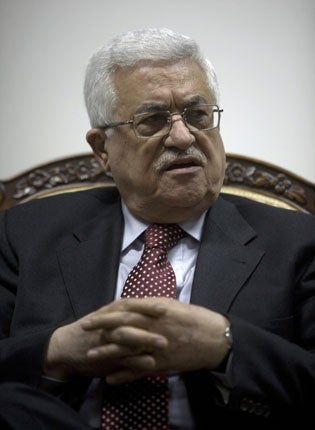Poll date pushes Palestinian rivals even further apart

Your support helps us to tell the story
From reproductive rights to climate change to Big Tech, The Independent is on the ground when the story is developing. Whether it's investigating the financials of Elon Musk's pro-Trump PAC or producing our latest documentary, 'The A Word', which shines a light on the American women fighting for reproductive rights, we know how important it is to parse out the facts from the messaging.
At such a critical moment in US history, we need reporters on the ground. Your donation allows us to keep sending journalists to speak to both sides of the story.
The Independent is trusted by Americans across the entire political spectrum. And unlike many other quality news outlets, we choose not to lock Americans out of our reporting and analysis with paywalls. We believe quality journalism should be available to everyone, paid for by those who can afford it.
Your support makes all the difference.Hamas, the militant Palestinian movement that rules the Gaza Strip is accusing Mahmoud Abbas, the moderate president in the West Bank, of deepening internal Palestinian divisions by unilaterally setting January elections.
Hamas’s political chief Khaled Meshaal said over the weekend that the decision, announced late Friday, to hold polls without reaching prior agreement on a date with Hamas was “illegal” and “illegitimate”.
The dispute has the potential to transform the rivalry between Hamas and Fatah in recent years into a long-term division between the West Bank and Gaza Strip, something that would deal a crippling blow to Palestinian statehood aspirations. Israel, situated between those two territories, could use the absence of any leadership that speaks for all Palestinians as a reason for not making peace concessions and the West Bank and Gaza could evolve along separate political trajectories.
Speaking from Damascus, Mr Meshaal said Mr Abbas “bears responsibility for deepening the division” and warned that Hamas and its allies “have open choices” in terms of how to respond to the decree. In Gaza, the rhetoric was even tougher, with Ahmed Bahar, a senior Hamas MP, calling for Mr Abbas to be put on trial for “usurping power”.
Hamas maintains that Mr. Abbas’s term expired last January, four years after he was elected. But Mr Abbas’s supporters want presidential elections to take place at the same time as those for parliament whose four-year term runs out on 24 January.
Hamas is wary of elections because it fears it will be unable to repeat its stunning victory in the 2006 legislative elections. Current polls show Fatah taking 40 per cent of the vote to Hamas’s 18 per cent – although it should be noted that the polls were tipping Fatah before the 2006 vote.
Talal Awkal, a columnist for the pro-Fatah al-Ayyam newspaper, suggested that Hamas might call its own elections in the Gaza Strip if Mr Abbas went ahead with a bal
lot in the West Bank. “This means we go from a situation of division to one of breaking apart,” he said.
Mr Abbas’s supporters say that constitutionally he had no choice but to set the 24 January poll now because his term and that of the legislative council are due to expire on that date and the law requires that an decree be issued three months in advance.
Legally polling can only be postponed by agreement among the factions. However, Hamas has been withholding its signature from an Egyptian document aimed at reconciling it with Fatah, still hoping it can get better terms. That document sets elections for June.
Mr Abbas’s early election call is a tactic to press Hamas to sign on to the Egyptian document, says Hani Masri, director of the Bada’il think tank in Ramallah. “He’s counting on Hamas signing, but it might not,” Mr Masri said.
*Israeli forces stormed Jerusalem’s holiest shrine today, firing stun grenades to disperse hundreds of stone-throwing Palestinian protesters in a fresh eruption of violence at the most volatile spot in the Holy Land.
A wall of Israeli riot police behind plexiglass shields closed in on the crowd, sending many protesters running for cover into the black-domed Al-Aqsa mosque. The mosque is one part of the compound known to Jews as the Temple Mount and to Muslims as the Noble Sanctuary.
The Israeli forces did not enter the building, and after a stand-off of several hours the protesters eventually left peacefully and the compound was closed, police said.
There were no serious injuries.
Join our commenting forum
Join thought-provoking conversations, follow other Independent readers and see their replies
Comments